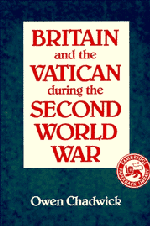Book contents
- Frontmatter
- Contents
- Acknowledgements
- Abbreviations
- 1 Britain and the Vatican in the last years of Pope Pius XI (1935–39)
- 2 The Conclave of 1939
- 3 The peace plans of Pius XII
- 4 The winter war, 1939–40
- 5 The Italian entry into the war
- 6 First months in the Vatican
- 7 Surveillance I
- 8 Surveillance II: the bag
- 9 The Jews in 1942
- 10 The bombing of Rome
- 11 The Italian Armistice
- 12 The German Occupation
- 13 Aftermath
- Select bibliography
- Index
- Frontmatter
- Contents
- Acknowledgements
- Abbreviations
- 1 Britain and the Vatican in the last years of Pope Pius XI (1935–39)
- 2 The Conclave of 1939
- 3 The peace plans of Pius XII
- 4 The winter war, 1939–40
- 5 The Italian entry into the war
- 6 First months in the Vatican
- 7 Surveillance I
- 8 Surveillance II: the bag
- 9 The Jews in 1942
- 10 The bombing of Rome
- 11 The Italian Armistice
- 12 The German Occupation
- 13 Aftermath
- Select bibliography
- Index
Summary
The use in war of moral condemnation
Every warring state wants its cause to be seen as moral. Men will fight better for a cause which they think moral. Neutral states will be readier to befriend a state which they believe to be engaged in a righteous fight. The Pope was in theory useful to the belligerents as he stood for moral right. His stand could affect the opinion or morale of their people and the benevolence of neutral states. No one expected a Pope to declare one side to have all justice, or to say that for one side this was a just war. Just occasionally they hoped to persuade him to assert that a particular course of action was just, or at least justified. When the Germans invaded Russia in June 1941, they hoped to persuade the Pope to say that this was a crusade on behalf of European Christendom. Popes had so often condemned atheistic Communism and its materialistic philosophy of life. Germany was the bulwark of Europe, and set out to free Europe for ever from the menace of atheistic Communism. This was not a promising endeavour. We have seen why it was unthinkable inside the Vatican. The Pope's failure to declare the invasion a crusade did not surprise Hitler, who had a low opinion of Popes, but vexed Mussolini, who really thought it a crusade and was hurt that the Church refused to say so; and it pleased the British who were afraid that the Vatican might think it a crusade.
- Type
- Chapter
- Information
- Britain and the Vatican during the Second World War , pp. 198 - 221Publisher: Cambridge University PressPrint publication year: 1987



